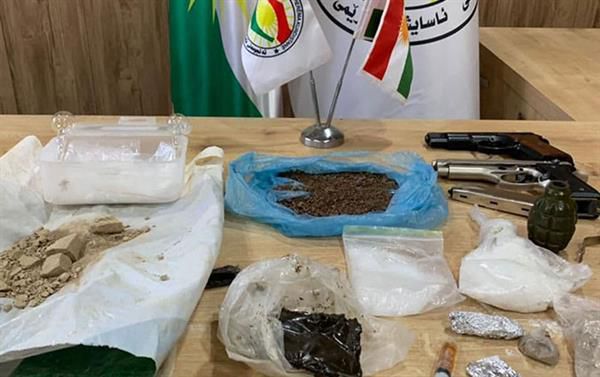The ninth cabinet of the Kurdistan Regional Government (KRG) has arrested over 11,000 drug offenders, nearly 3,000 of whom were traffickers, seizing large quantities of narcotics, approximately 2,408 kilograms, in a bid to combat rising drug abuse and trafficking.
One of the key challenges the KRG under the leadership of Prime Minister Masrour Barzani has faced is confronting drug trafficking and usage. Over the past five years, KRG’s efforts to prevent drug trafficking have been significantly intensified.
Prime Minister Barzani has repeatedly emphasized that “the KRG is rigorously and extensively working to counter this serious threat and is making every effort to prevent its further spread.”
The Prime Minister reiterated that “drug abuse not only harms the health of the user but also brings social, economic, security, and financial damage to all aspects of society. It is a major factor in undermining human capital.”
The Kurdish Globe has learned that the KRG’s Anti-Drug Directorate, from early 2018 to August 1, 2024, over 11,145 drug offenders were arrested, with 2,857 of them being traffickers, and 5,596 of those arrested have been sentenced.
During the ninth cabinet, 2,407.919 kilograms of drugs and 113,311 drug pills were seized.
The types of drugs seized include crystal meth, opium, hashish, heroin, marijuana, jamaica, and cocaine. Additionally, the types of pills seized include Tramadol, Trefin, Sodafed, Somadryl, Diazepam, Clonazepam, Methadone, B2, X, Captagon, and Lexus.
The Kurdistan Regional Government (KRG) has been ramping up its efforts to combat the spread of narcotics and illegal drug use, with drug control operations intensifying over recent years. A look at the data highlights the scale and growth of this challenge.
In 2018, the KRG arrested 1,148 individuals for drug-related offenses, including 205 traffickers. Despite relatively modest conviction rates (97 offenders convicted), the authorities seized a substantial 414.553 kg of various drugs and 17,281 illicit pills. This marked the beginning of a determined push to stem the flow of narcotics in the region.
By 2019, the arrests rose slightly to 1,182, with 212 traffickers among them, and the number of convicted offenders surged to 530. However, the amount of drugs seized dropped to 153.912 kg, while 9,215 pills were confiscated. This fluctuation in drug seizures suggests that traffickers may have been adapting their methods. Still, the increase in convictions indicates that law enforcement was becoming more effective in processing cases through the courts.
In 2020, the drug problem escalated further, with arrests increasing to 1,295 offenders, including 235 traffickers. A significant 916 offenders were convicted, signaling a more robust judicial response. Seizures of narcotics also rose sharply, with 555.749 kg of drugs and 2,734 pills confiscated, reflecting the growing scale of the crisis.
The year 2021 saw a marked escalation, with a surge in both arrests and drug seizures. 1,943 individuals were arrested, including 302 traffickers, while 733 convictions were secured. Authorities confiscated 374.729 kg of narcotics and an eye-opening 47,378 pills, suggesting a widespread issue with pill-based substances like opioids and other synthetic drugs.
By 2022, the figures continued to climb. The number of arrests jumped to 2,192, with 304 traffickers apprehended. Convictions soared to 1,266, and while the amount of narcotics seized dropped to 232.493 kg, a staggering 937.250 kg of various pills were taken off the streets. This highlights the changing nature of the drug trade, with a growing focus on synthetic pills and the challenges they pose for law enforcement.
The situation took a critical turn in 2023, with arrests reaching 2,482, including a significant increase in traffickers to 1,070. Convictions stayed high at 1,116, and authorities seized 482.124 kg of drugs. The amount of pills confiscated grew exponentially, with over 2,343 kg of various pills, showing the rising threat of pill-based narcotics flooding the region.
In just the first eight months of 2024, the KRG has already arrested 1,003 offenders, with 529 traffickers among them. A total of 938 convictions have been handed down, and law enforcement seized 194.359 kg of narcotics, alongside 28,990 pills. These figures, even within such a short time frame, suggest that the KRG’s battle against drug-related crime is far from over.
Penalties for drug users and traffickers
According to statistics from the KRG’s General Directorate for Drug Control, 80 percent of drug users in the Kurdistan Region are aged between 18 and 35, with 10 percent of the users being women.
Under Article 26 of the Anti-Drug Law passed by the Kurdistan Parliament, those engaged in drug trafficking can be sentenced to life imprisonment, along with a fine of no less than 15 million Iraqi dinars and no more than 90 million Iraqi dinars.
For drug users, the penalty begins with a minimum one-year prison sentence, depending on the type and method of use, along with a fine not exceeding 15 million Iraqi dinars.
The Kurdish Globe

